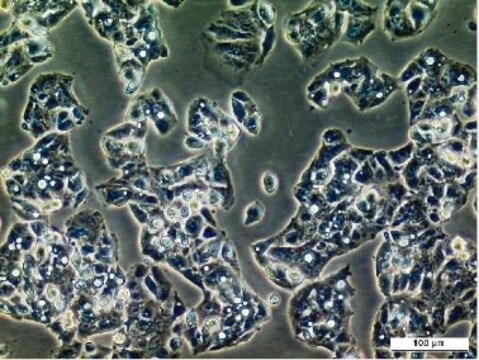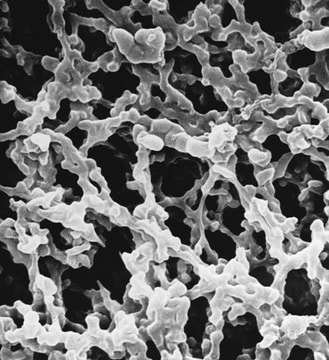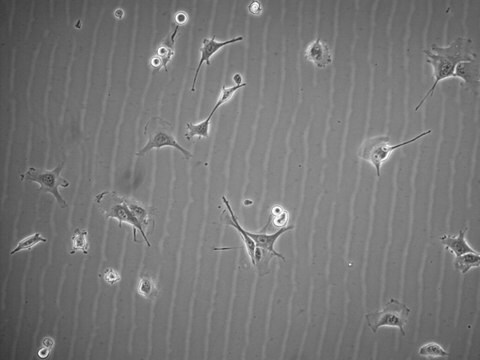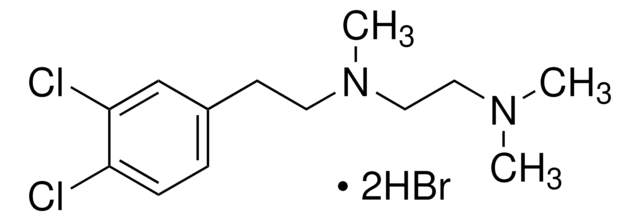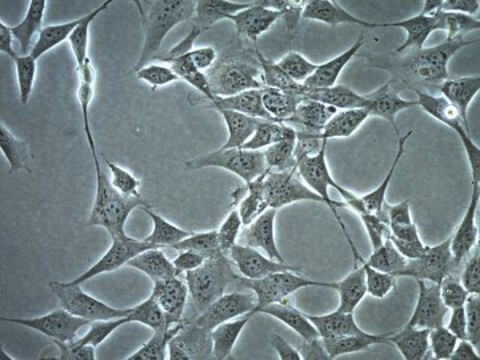SCC199
HGT-1 Human Gastric Cancer Cell Line
Se connecterpour consulter vos tarifs contractuels et ceux de votre entreprise/organisme
About This Item
Code UNSPSC :
41106514
eCl@ss :
32011203
Nomenclature NACRES :
NA.45
Produits recommandés
Description
Cell line type: Cancer Cells
Technique(s)
cell culture | mammalian: suitable
Description générale
Gastric adenocarcinoma is the most common type of gastric cancer, representing 95% of malignancies that originate in the stomach (1). The incidence of gastric adenocarcinoma is especially high in Central and Eastern Asia and areas of Eastern Europe and South America, comprising a significant global health burden (1). Robust models of gastric cancer that reflect the most prevalent form of this disease are therefore highly valuable.
References:
1. Nat Rev Dis Primers 2017; 3: 17036.
2. Cancer Res 1982; 42(4): 1541-1548.
References:
1. Nat Rev Dis Primers 2017; 3: 17036.
2. Cancer Res 1982; 42(4): 1541-1548.
The HGT-1 human gastric cancer cell line is derived from a poorly-differentiated adenocarcinoma and is well-established as a model for studies of gastric cancer and mechanisms of gastric secretion. HGT-1 cells are tumorigenic in nude mice and have a hyperdiploid karyotype (2). HGT-1 cells do not secrete mucus, yet maintain expression of functional histamine H2 receptors also found in normal acid-secreting parietal cells (2).
Source:
The HGT-1 cell line was established from a primary tumor of a 60-year-old male patient (2).
Source:
The HGT-1 cell line was established from a primary tumor of a 60-year-old male patient (2).
Application
This product is sold solely for research use per the terms of the “Restricted Use Agreement” which govern its use as detailed in the product Data Sheet or Certificate of Analysis. For information regarding any other use, please contact licensing@emdmillipore.com.
Qualité
- Each vial contains >=1X106 viable cells.
- Cells are tested negative for infectious diseases by a Human Essential CLEAR panel by Charles River Animal Diagnostic Services.
- Cells are verified to be of human origin and negative for inter-species contamination from rat, mouse, chinese hamster, Golden Syrian hamster, and non-human primate (NHP) as assessed by a Contamination CLEAR panel by Charles River Animal Diagnostic Services.
- Cells are negative for mycoplasma contamination.
- Each lot of cells is genotyped by STR analysis to verify the unique identity of the cell line.
Stockage et stabilité
Store in liquid nitrogen. The cells can be cultured for at least 10 passages after initial thawing without significantly affecting the cell marker expression and functionality.
Clause de non-responsabilité
Unless otherwise stated in our catalog or other company documentation accompanying the product(s), our products are intended for research use only and are not to be used for any other purpose, which includes but is not limited to, unauthorized commercial uses, in vitro diagnostic uses, ex vivo or in vivo therapeutic uses or any type of consumption or application to humans or animals.
Code de la classe de stockage
12 - Non Combustible Liquids
Classe de danger pour l'eau (WGK)
WGK 2
Point d'éclair (°F)
does not flash
Point d'éclair (°C)
does not flash
Certificats d'analyse (COA)
Recherchez un Certificats d'analyse (COA) en saisissant le numéro de lot du produit. Les numéros de lot figurent sur l'étiquette du produit après les mots "Lot" ou "Batch".
Déjà en possession de ce produit ?
Retrouvez la documentation relative aux produits que vous avez récemment achetés dans la Bibliothèque de documents.
Notre équipe de scientifiques dispose d'une expérience dans tous les secteurs de la recherche, notamment en sciences de la vie, science des matériaux, synthèse chimique, chromatographie, analyse et dans de nombreux autres domaines..
Contacter notre Service technique